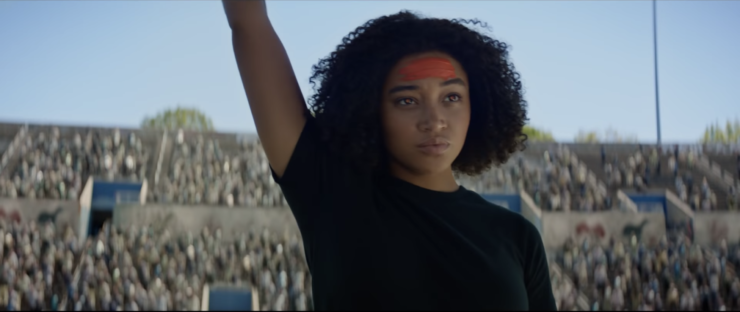It’s difficult to pinpoint the exact moment that YA dystopia The Darkest Minds feels the most derivative. Honestly, my ennui starts in the first minutes of the movie, with the mysterious disease that kills 90% of the USA’s children and imbues the survivors with powers for reasons, with the suddenly-superpowered children herded into camps and/or experimented on à la The Maze Runner. Then there’s the headscratcher of a cameo in which Gwendoline Christie dons an awful brunette wig to play Lady Jane, a bounty hunter chasing mutants psychically-gifted kids through the woods—the requisite stunt casting like Diane Kruger in The Host, or Patricia Clarkson in Maze. And even the ending shot (bafflingly revealed in every trailer) of Special Girl Ruby (Amandla Stenberg) smearing orange paint across her forehead and raising a hand to the dozens of other kids—painted green, blue, gold—smacks of both Divergent’s color-coded caste systems and The Hunger Games’ rebellious salute.
Nearly every major beat of The Darkest Minds is directly reminiscent of a different dystopian movie that’s come before. And the sole element that could have set this movie apart—the notion of the government separating “dangerous” children from their parents and imprisoning them in detention camps—is squandered.
Spoilers because, let’s face it, you’re not going to see this.
It’s not entirely the movie’s fault that it had crappy timing. Alexandra Bracken’s novel The Darkest Minds was published in 2012, the same year that the second Divergent books was hitting shelves and the first Hunger Games movie was capitalizing on the YA dystopia trend at the box office. Its protagonist, Ruby Daly, is one of the 2% of children who survive IAAN (Idiopathic Adolescent Acute Neurodegeneration), a disease whose provenance is unknown but whose effects are devastating on the country: the majority of children die upon their tenth birthdays, while those who remain manifest powers that adults classify according to the old Homeland Security Advisory System—that is, super-smart Greens are the least dangerous, moving up to telekinetic Blues, electricity-wielding Golds, mind-controlling Oranges, and fire-breathing (?) Reds. (The movie helpfully has the kids’ eyes light up in their respective color when demonstrating their powers.)
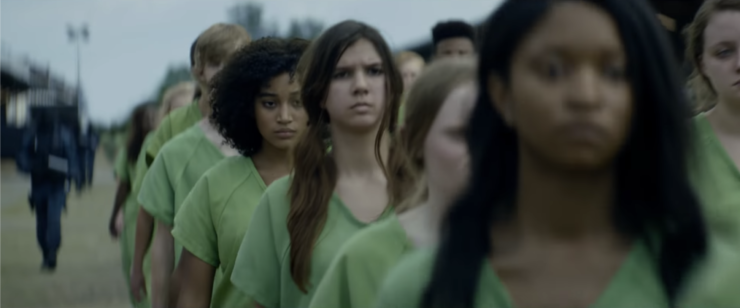
Ruby is an Orange, regarded as a major threat despite her inability to control her powers. To wit, she accidentally erases herself from her parents’ memories, which gets her thrown into one of the government’s “rehabilitation camps.” To avoid extermination, she tricks the doctors and soldiers into believing that she’s a harmless Blue (changed to Green in the movie), but she can only keep up the ruse for so long. When a fringe group called the Children’s League helps break her out of the camp, Ruby goes on the run with three other escaped kids, trying to find a hidden safe haven where adults can’t threaten them.
Since the book was published six years ago, The Hunger Games and The Maze Runner have wrapped up their respective movie trilogies, and Divergent only got through three of its five planned movies. (There’s a TV series in the works, but we’re not holding our breaths.) YA dystopia has peaked, so to come along with a movie adaptation now feels ill-conceived.
Buy the Book
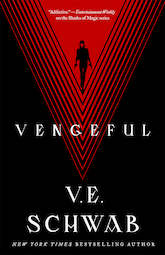

Vengeful
And yet, the early trailers seemed to point to a shocking bit of synergy with the current news cycle, in the sequences in which Ruby and other kids are put in color-coded jumpsuits and subjected to hard labor, watched over by soldiers who fear and hate them in equal measure. But Ruby spends barely 15 minutes at the camp before she’s sprung, and that particular establishment melts into a shadowy sort of threat that never quite reaches her for the rest of the film. I’m not saying I would have liked to see a movie set primarily at the camp, but it would have been a unique setting to utilize, to better explore the tension between children who, instead of receiving proper training for their new powers, are treated liked caged animals—wrenched away from parents who are fighting to get them back, or who blindly trust The Powers That Be to cure their dangerous children so that things can go back to normal.
But it’s not normal: six years after the first IAAN blast, the world has an eerie, Children of Men-esque quality, as the majority of adults have moved from the suburbs into the cities, without children to support but also to chase a dying economy that has no young consumers to cater to. Meanwhile, the superpowered teens hide from any adult, whether it’s the Children’s League who are either helping them or weaponizing them (depending who you ask), or the aforementioned bounty hunter “tracers,” or the military. So ingrained is that fear that Ruby hitches a ride with a van of three other teens because it’s her best bet: Suzume (Miya Cech), a silent Gold; Chubs (Skylan Brooks), a snarky Green; and Liam (Harris Dickinson), a Blue still suffering trauma from his experience with the League.
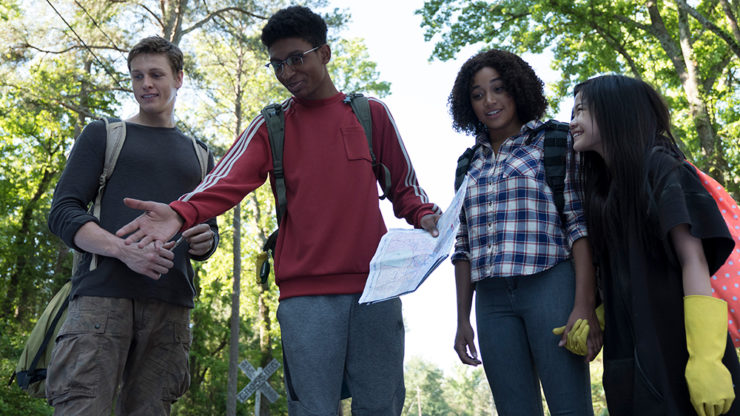
Bracken has said that The Darkest Minds is “filled with things I love to help cheer me up when I was having a hard time my first year out of school: teens with superpowers, a found family, classic rock, romance, Virginia, road trips, you name it!” And you know what? I would have been interested in a movie about a found family of kids on a road trip in a world that wants to capture them. But, like with the sequence at the camp, the road trip portions feel like a means to an end—the end being the runaway teens camp East River, led by the enigmatic “Slip Kid” (did anyone else get a Hey Arnold! flashback to Stoop Kid?), where kids of all colors live together in harmony instead of hierarchy.
Because the road trip section of the movie is just spinning wheels, Ruby’s friendships with Zu and Chubs only really scratch the surface: there are Twinkie picnics with the former and a moment of begrudging connection with the latter, but it all feels secondary to the overarching dystopian plot that’s clearly pointing toward a big showdown at the end of the road, not on it. The movie wants us to root for Ruby/Liam the way we did for Katniss/Peeta or Tris/Four, but their bashful smiles and non-sequitur jokes about the prom and other teen milestones fail to generate enough chemistry to be compelling. So by the time that Clancy, the other remaining Orange, comes along, he doesn’t threaten Liam as a love interest so much as threaten everyone because he’s the clearly-telegraphed villain.
Here I will make the nerdiest of nitpicks: Liam and Ruby’s flirting involves a groan-inducing exchange in which he compares her to Harry Potter, then tries to figure out if he’s Hermione or Ginny (culminating in Ruby’s painful line about how Harry gets with Ginny, tee hee). But he could have just compared her to Hermione to start. Seeing as, you know, she erases herself from her parents’ memories. Come on, guys, it was right there.
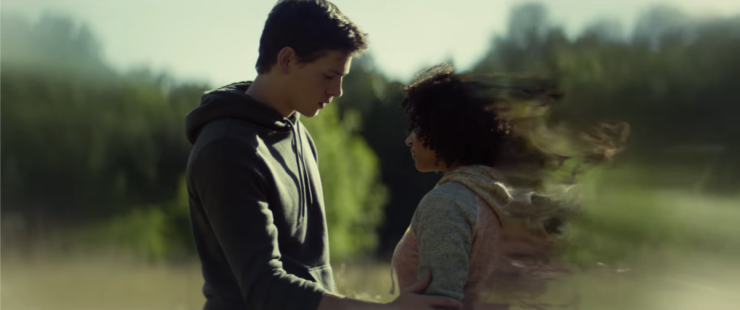
Much like the Hermione miss, the movie fails to get to Ruby’s mastering of her powers—at the creepy hands of Clancy, natch—early enough for it to really matter to either the plot or her character arc. After keeping to herself and not letting anyone—not Liam, not other friends—get close for a Rogue-like fear that the moment she touches them she’ll somehow ruin their minds, Ruby learns that she’s not the monster she thought she was, she’s just… someone with incredible power to alter memories? But it’s OK because she didn’t mean to change her parents’ lives, but now she should train so that she can use her powers…? The message is completely muddled. Her self-esteem seems to have improved, but then the movie culminates in her committing the same life-altering use of her powers, except this time she means to.
I saw this coming a mile away, and damned if I didn’t still tear up. Not because I actually cared about Ruby and Liam, but because there is some poetry to Ruby’s accident, which severs her from her normal life, being the thing that helps her move forward with the League toward an unknown future. Except. Except for the really unfortunate special effects used to make Ruby drift out of Liam’s memories, that in a pre-Avengers: Infinity War world might have tugged the heartstrings, but instead make it look like Ruby was a victim of The Snap. The filmmakers probably intended Ruby’s self-erasure to look whimsical like The Time Traveler’s Wife, but instead it just made me muffle inappropriate laughter during their entire schmoopy montage. (Another key visual that got spoiled in the marketing materials. WHY.)
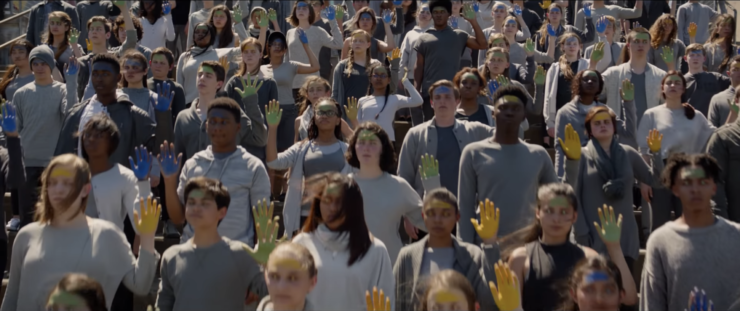
The Darkest Minds ends on the typical first-book-of-a-dystopian-series not of ambiguity, where the Special Girl has found some sort of calling. Except that where The Hunger Games has Katniss mobilizing against a clear threat, Ruby doesn’t seem to know what her future holds. She stands, marked as an Orange, in front of an army (?) of her fellow gifted children, but there is no sense what she is leading them towards. And I can’t imagine that a studio will spend money, or audiences will spend theirs, on the rest of the movies to find out.
In case the sequels never get made, the meaning behind the title seems to be spelled out in Bracken’s published books: “The darkest minds never fade in the afterlight. In time, sparks rise.” OK then. Natalie Zutter hopes you appreciated this tidbit and recommends just watching Children of Men again. Skip the dystopia talk and tell her your favorite new, gamechanging YA on Twitter!










